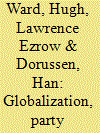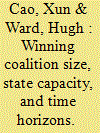|
|
|
Sort Order |
|
|
|
Items / Page
|
|
|
|
|
|
|
| Srl | Item |
| 1 |
ID:
106335


|
|
|
|
|
| Publication |
2011.
|
| Summary/Abstract |
The authors argue that the effects of economic globalization on social democratic parties in Western Europe are conditional on the position of the median voter. If the median is far enough to the right, such parties will adopt business-friendly policies because they are required to win office. Only when the median is relatively far to the left will globalization constrain social democratic parties, forcing them to adopt policies further to the right in order to retain credibility. It is on this basis the authors argue that empirical studies are misspecified unless they include an interaction between measures of globalization and the position of the median. In addition to presenting formal theoretical arguments, the article reports empirical findings from fifteen countries in the period from 1973 to 2002 that support the conclusion that the effects of globalization are indeed contingent on the median. The authors find that the effects of globalization are significant for social democratic parties only in circumstances in which the median is relatively far to the left.
|
|
|
|
|
|
|
|
|
|
|
|
|
|
|
|
| 2 |
ID:
068744


|
|
|
| 3 |
ID:
145697


|
|
|
|
|
| Summary/Abstract |
Why do countries contribute troops to UN peacekeeping? Recognizing the incentives to free ride on the contributions of other countries, existing explanations have tended to focus on the private benefits of providing troops. There has been particular emphasis on some major contributing countries that gain financially from providing peacekeepers. An alternative explanation could be that countries prefer to deploy troops to peacekeeping alongside countries with similar foreign policy preferences in order to maximize jointly produced private benefits. Accordingly, the willingness to provide peacekeepers should depend on which other countries are providing troops to peacekeeping operations. The implications are explored within the context of games on networks, and it is demonstrated that in equilibrium countries that are more Bonacich central in the network of foreign policy preference contribute disproportionally to UN peacekeeping. Based on actual contributions to UN peacekeeping from 1990 until 2011, we find that policy complementarities explain why countries provide a larger proportion of peacekeepers to a particular mission. Importantly, centrality in the network of policy complementarities matters and not simply that countries have moderate policy preferences. There is robust evidence for the prevalence of peacekeeping alongside your ‘friends’; in effect, countries with a lot of ‘friends’ contribute more peacekeepers.
|
|
|
|
|
|
|
|
|
|
|
|
|
|
|
|
| 4 |
ID:
093601


|
|
|
|
|
| Publication |
2010.
|
| Summary/Abstract |
Classical-liberal arguments about the pacifying effects of international trade are revisited, and it is argued that they consistently refer to the ability of trade to provide 'connections' between people and to create a perceived 'global community'. Dependency and openness are commonly used to test for any pacifying effects of trade in the current literature, but these measures fail to capture some of the classical liberals' key insights. Several network measures are introduced in order to give natural expression to and to develop the classical-liberal view that trade linkages reduce interstate conflict. These measures applied to trade flows are incorporated in the Russett & Oneal triangulating-peace model. The main results are that trade networks are indeed pacifying in that both direct and indirect trade linkages matter, and as the global trade network has become more dense over time, the importance of indirect links by way of specific third countries has declined, and the general embeddedness of state dyads in the trade network has become more relevant. These findings suggest that the period since World War II has seen progressive realization of the classical-liberal ideal of a security community of trading states.
|
|
|
|
|
|
|
|
|
|
|
|
|
|
|
|
| 5 |
ID:
139528


|
|
|
|
|
| Summary/Abstract |
Selectorate theory proposes that authoritarian regimes supply fewer public goods than democracies. Smaller winning coalitions make it less costly for autocracies to maintain support among critical groups by providing private goods. Democracies, with large winning coalitions, find it cheaper to provide public goods. In contrast, we argue for a conditional effect of winning coalition size on public good provisions: Many public goods require considerable state capacity to plan, legislate, and implement. Moreover, leaders with short-term horizons are unlikely to invest in public goods that take considerable time to provide. Therefore, our modified selectorate theory suggests that governments will provide public goods if the size of the winning coalition is large enough, state capacity is great enough, and a priori regime durability is long enough. We test our theory on air pollution. While selectorate theory receives little empirical support, our findings cohere with modified selectorate theory. In particular, core democracies—defined as those with large winning coalitions, considerable state capacity, and high regime stability—perform better than autocracies in controlling air pollution.
|
|
|
|
|
|
|
|
|
|
|
|
|
|
|
|
|
|
|
|
|